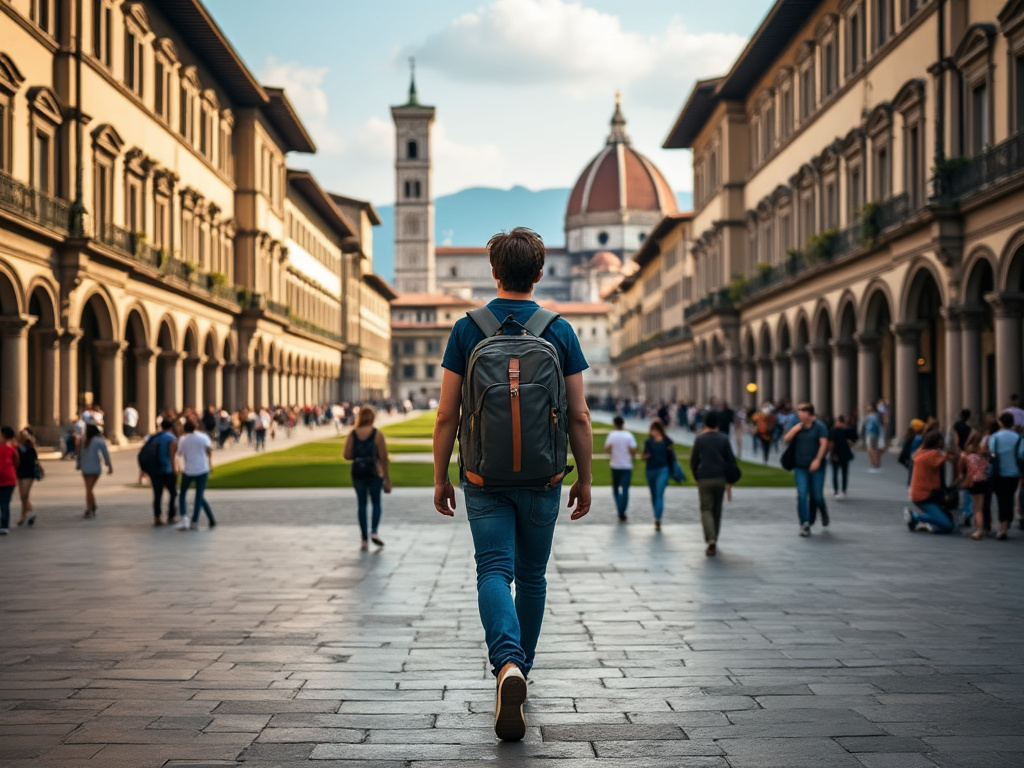Establishing residency in Italy is a dream for many, whether it’s for Italian citizenship, work, retirement, or family. In this guide, we will explore the types of residency permits available, the application process, and how to navigate the financial and language requirements.
EU vs Non-EU Citizens
Residency requirements in Italy vary depending on your citizenship. EU citizens have the freedom to live and work in Italy with minimal documentation, whereas non-EU citizens must undergo a more extensive application process.
EU Citizens:
- Right to reside and work without a visa
- Must register with local authorities if staying longer than three months
Non-EU Citizens:
- Must obtain a visa before entering Italy for work, study, or other purposes
- Require residency permits for long-term stays
For non-EU citizens, Italy offers several types of visas and permits, and understanding which one suits your situation is crucial to ensuring a smooth transition. The next subsections detail the options for non-EU citizens who would like to request residency in Italy.
Types of Residency Permits in Italy

When seeking residency in Italy, there are several visa and permit options depending on your situation. Each permit has specific requirements and application processes. Below, we explore the most common types.
1. Elective Residency Visa
The elective residency visa is perfect for retirees or those with independent income sources who plan to live in Italy without working. It’s ideal for individuals who wish to enjoy the Italian lifestyle while relying on their pensions or savings. However, this visa requires proof of sufficient financial resources to support your stay without employment.
Requirements for the Elective Residency Visa:
a) Proof of Consistent Income
- You need to show that you have a stable and sufficient income to support yourself during your stay in Italy. This income must not come from employment in Italy and should be sourced from pensions, annuities, dividends, or rental properties. The minimum required income is generally around €31,000 per year for a single applicant, but this can increase depending on your family size:
- For a couple, the required income is approximately €38,000.
- If you are bringing dependents (children or other family members), you will need to provide additional income proof of about €20,000 per dependent.
- Your income sources must be reliable, documented, and provable through bank statements, pension statements, or investment reports.
b) Proof of Suitable Accommodation in Italy
You must have a place to live in Italy before applying for the visa. This could be a rental agreement or proof of property ownership. The contract must show a suitable and long-term residence, with enough space for all applicants listed on the visa.It is recommended to present a long-term rental contract (minimum of one year) or property deed that clearly states the location, size, and type of property, as Italian authorities will evaluate whether the accommodation is appropriate for your intended stay.
c) Health Insurance Covering All Medical Expenses
You are required to have comprehensive private health insurance that covers all medical expenses during your stay in Italy. The insurance must be valid for the entire duration of your residency and cover the following:
- Hospitalization and emergency medical care.
- Routine medical visits and treatments.
- Repatriation in case of medical emergencies requiring transport back to your home country.
The policy should offer coverage of at least €30,000 for medical emergencies, a common benchmark for visa purposes. Italian authorities may ask for proof that your policy covers both Italy and other Schengen Area countries.
This visa allows you to live in Italy indefinitely as long as you meet these financial requirements. However, it does not permit you to work, so be sure you have sufficient funds to support yourself.
2. Work and Self-Employment Visas
If you’re looking to work or start a business in Italy, a work or self-employment visa is necessary. For those seeking employment, obtaining a job offer from an Italian company is usually the first step. Employers must apply for a “nulla osta” (authorization) on your behalf, and once approved, you can proceed with the visa application.

Self-Employment Visa Requirements:
- Business plan outlining your freelance work or entrepreneurial venture
- Proof of financial stability to sustain your business
- Necessary permits for regulated professions in Italy (if applicable)
For freelancers, Italy also has options like the “freelance work visa,” which allows individuals in fields like digital marketing or consulting to apply.
3. Study Visas
Students planning to attend university in Italy need a study visa. Once enrolled in a recognized institution, you can apply for temporary residency, which is usually granted for the duration of your studies.
Key Documents for a Study Visa:
a) Proof of university enrollment
You must provide an official letter of acceptance from an Italian university or educational institution, including the duration of your studies and course name.
b) Health insurance
You must have valid health insurance that provides comprehensive coverage during your entire stay in Italy. This can either be:
- Private health insurance from your home country that covers your medical expenses in Italy and other Schengen countries, with a minimum coverage of €30,000 for medical treatment and emergencies.Alternatively, some students opt for the Italian National Health Service (Servizio Sanitario Nazionale – SSN). This can be obtained upon arrival in Italy, offering more affordable healthcare options.
c) Financial proof showing you can support yourself during your studies.
This can include:
- Bank statements showing a minimum amount of €6,000 to €10,000 per year (the exact amount may vary depending on the consulate).
- If you are receiving a scholarship or grant, you must include an official letter confirming the award, its value, and duration.
- If a parent or sponsor is financially supporting you, you will need to provide a letter of sponsorship along with their bank statements and proof of their income, such as pay slips or tax returns.
- Additionally, you may be asked to provide details of any accommodation arrangements (such as a rental agreement or student housing contract) to further confirm your financial stability.

Residency Application Process
Step-by-Step Guide to Applying for Residency in Italy
Applying for residency in Italy involves specific steps that vary depending on your visa type and circumstances. Whether you are applying for temporary residency, permanent residency, or Italian citizenship while in Italy, this guide will walk you through the necessary steps and documents.
a) Obtain a Visa (if applicable)
Before entering Italy, you may need to apply for the appropriate visa through the Italian consulate in your home country. The type of visa you need depends on your purpose for staying in Italy:
- Elective Residency Visa: For retirees or those with independent income.
- Work Visa: For those seeking employment or starting a business.
- Study Visa: For students attending an Italian university.
- Visa for Family Reunification: For individuals joining family members already residing in Italy.
- Italian Citizenship Visa: If you’re applying for Italian citizenship by descent or marriage from within Italy, a visa may not be necessary, but be prepared to follow specific residency steps.
Once your visa is granted, you’ll be eligible to enter Italy and begin the residency application process.
b) Gather All Necessary Documents
Regardless of the visa or residency type, you’ll need to collect several important documents to apply for your residency permit. Specific documentation requirements may vary by visa type, but the following are common:
- Valid Passport: Must be valid for the duration of your stay.
- Proof of Income: Bank statements, tax returns, or pension statements showing you can financially support yourself (amount depends on visa type).
- Proof of Accommodation: A rental contract, property ownership, or proof of stay with a family member or sponsor.
- Health Insurance: Must cover your medical needs in Italy, with minimum coverage of €30,000, unless you enroll in the Italian National Health Service (SSN).
- Visa (if applicable): Copy of your visa and entry stamp if coming from a non-EU country.
- Tax Code (Codice Fiscale): This tax identification number is essential for signing rental contracts, opening a bank account, and dealing with Italian bureaucracy. You can apply for this at the Agenzia delle Entrate (Revenue Agency).
- Birth Certificate and Family Documentation: For those applying for Italian citizenship by descent (Jure Sanguinis), certified birth certificates of your Italian ancestors and other genealogical records are required. The birth certificate must be translated and apostilled.
c) Submit Your Application for Residency (Permesso di Soggiorno)
Once you have arrived in Italy, you must apply for a residency permit (Permesso di Soggiorno) within eight days of arrival. Here’s how to complete this process:
- Go to the Questura (Police Station): Visit the local Questura in your area to initiate the residency application. Bring all required documents and two passport-sized photographs.
- Fill out the Application Kit (Kit Soggiorno): This kit is available at post offices and contains forms to complete your application. Submit the completed forms, your documents, and a receipt for the application fee (typically around €30-100, depending on the permit type).
- Appointment for Fingerprints: After submitting your application, you will be given an appointment to have your fingerprints taken at the Questura.
- Processing Time: The processing time varies but typically takes between four to eight weeks. You will receive a receipt allowing you to stay legally in Italy while awaiting your permit.
For those applying for Italian citizenship from within Italy, the process differs slightly. You must still apply for a residency permit, but ensure you notify the Questura that your residency application is part of your citizenship process.

d) Receive Your Residency Permit
Once your application is processed, you will be notified by the Questura to collect your Permesso di Soggiorno. This permit allows you to legally reside in Italy and typically lasts:
- 1-2 years for temporary residency permits, depending on your visa type.
- If you are applying for Italian citizenship by descent or marriage, this temporary residency may extend until your citizenship application is finalized, which can take several months to over a year.
e) Register with the Local Municipality (Iscrizione Anagrafica)
After receiving your residency permit, you must register with the local municipality (Comune) where you will be living. This registration is required for:
- Officially confirming your residency status.
- Accessing local services, including healthcare and social services.
- Individuals applying for Italian citizenship must also register their residency as part of their citizenship process. Your Iscrizione Anagrafica is a critical part of the Italian citizenship application, and you’ll need a Certificato di Residenza (certificate of residency) when submitting your citizenship request.
f) Renew Your Residency Permit
Temporary residency permits must be renewed before they expire. Typically, you will need to apply for renewal at least 60 days before the expiration date. The renewal process is similar to the initial application and may involve providing updated financial and accommodation documents.
For individuals applying for Italian citizenship, if your application is still in process at the time your residency permit expires, you will need to renew the permit to continue living legally in Italy.
g) Permanent Residency and Citizenship
- Permanent Residency: After legally residing in Italy for five years (for EU citizens) or ten years (for non-EU citizens), you may apply for permanent residency. Permanent residency provides more stability and fewer renewal requirements.
- Italian Citizenship: If you qualify for Italian citizenship by descent or by marriage, your residency permit allows you to stay in Italy while your citizenship is being processed. Once granted, you will no longer need a residency permit and can enjoy the full benefits of Italian citizenship.
For more details on living costs in Italy, check out our Cost of Living in Italy Guide.

Documents Required for Residency:
- Valid passport: must be valid for at least six months beyond your intended stay in Italy
- Italian visa (if applicable): If you are a non-EU citizen, you will need to apply for a visa before entering Italy for long-term stays (e.g., Elective Residency, Work, Study, or Family Reunification Visa). If you’re applying for Italian citizenship (e.g., by descent), you may not need a visa but will still need to follow the residency permit process for legal residency during your application.
- Proof of residence: this can be through a rental contract or ownership. If staying with a friend or family member, they must provide a declaration of hospitality (dichiarazione di ospitalità) along with their own proof of residence (rental contract or property deed) and identification documents.
- Proof of income (for non-working residents)
- Health insurance policy
Tax and Financial Requirements
Tax Obligations for Residents
Living in Italy comes with certain tax responsibilities. Residents are subject to Italian taxation on their worldwide income. However, many countries, including the U.S., have double taxation agreements with Italy to prevent individuals from being taxed twice on the same income. The income must be declared annually through the Italian tax return (Modello Redditi), usually due by November 30th each year.
Finding Housing in Italy
Securing housing is a critical part of your residency process. Whether you’re buying property or renting, Italy offers various housing options. Popular cities like Rome, Milan, and Florence are known for their competitive housing markets, so it’s best to start your search early.
Use local real estate agents or online platforms to find a home that fits your needs. Many also choose to stay in smaller towns or rural areas for a more authentic Italian experience.
The three most popular websites to look for houses in Italy, both for renting and purchasing, are:
- Idealista
Idealista is a popular platform for real estate in Italy and other European countries. It offers a wide range of property listings for sale and rent, along with detailed descriptions, photos, and virtual tours. - Immobiliare.it
This is one of Italy’s largest and most comprehensive real estate platforms. It offers listings for rentals, property sales, and commercial properties. You can filter by location, property type, and price, with extensive search options. - Casa.it
Another leading real estate portal in Italy, Casa.it provides listings for both rentals and property purchases. It has a user-friendly interface and offers tools to compare properties and explore different regions.
Housing for Those Applying for Italian Citizenship
If you are applying for Italian citizenship by descent (Jure Sanguinis), you will need to secure a registered residence in Italy as part of the process. Ensure that the property you rent or own allows you to register with the local comune, as this is crucial for your citizenship application.
Language Requirements

While it’s not legally required to learn Italian for residency, speaking the language can significantly ease your transition. Many regions, especially outside of major cities, have limited English-speaking services. Learning Italian will also help you integrate better into local communities.
Recommended Language Resources:
Permanent Residency and Citizenship Pathways
After living in Italy for five years (as an EU citizen) or ten years (as a non-EU citizen), you can apply for permanent residency. This status allows you to live and work in Italy indefinitely.
For those seeking Italian citizenship, there are additional pathways, including:
- Italian Citizenship by Descent: If you have Italian ancestry, you may be eligible for citizenship.
- Italian Citizenship Through Marriage: After two years of marriage (or one year if you live in Italy), you can apply for citizenship through naturalization.
Special Residency Options
Italy also offers several lesser-known residency options, such as the Italian Golden Visa for investors. This visa is ideal for high-net-worth individuals looking to invest in Italy, providing an accelerated pathway to residency.
Additionally, Italy is becoming a popular destination for digital nomads and remote workers. While Italy does not yet have a formal digital nomad visa, freelancers can apply for self-employment visas.
Conclusion
Establishing residency in Italy can be a rewarding experience, whether you’re seeking a new life in a vibrant European country or applying for Italian citizenship. Be sure to gather all necessary documents, follow the application steps, and meet the financial requirements. And don’t forget—learning Italian and integrating into local culture can make your journey smoother.
If you’re interested in learning more about the cost of living, the residency process, or Italian citizenship options, follow us on Instagram and consult our Italian birth records database for your genealogical research needs.

